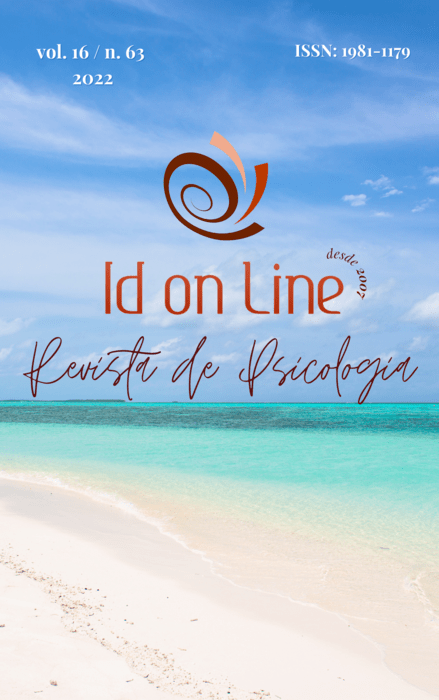Impactos da Pandemia de Sars-Cov-2 sobre a Saúde Mental: Levantamento epidemiológico sobre os atendimentos realizados em um hospital psiquiátrico no sudoeste mineiro / Impacts of the Sars-Cov-2 Pandemic on Mental Health: Epidemiological survey on the services provided in a psychiatric hospital in the southwest of Minas Gerais
DOI:
https://doi.org/10.14295/idonline.v16i63.3534Palavras-chave:
SARS-CoV-2. Saúde mental. PandemiaResumo
O SARS-CoV-2 é o vírus contagioso que dissemina-se facilmente por meio de gotículas e aerossóis de indivíduos infectados, sendo responsável por mais de 619 mil mortes e 22,2 milhões de pessoas infectadas no Brasil até o início de janeiro do ano de 2022. Sem imunização previa contra o vírus algumas medidas se tornaram obrigatórias para frear a disseminação como o uso de mascaras, limpeza de objetos e superfícies, lavagem das mãos e o isolamento social. A pandemia além de ameaçar a saúde integra do indivíduo acarretou em diversos outros problemas como mortes, dificuldade financeira, falta de emprego, inconsistência dos governos e sistema de saúde sobrecarregado, resultando na piora generalizada da saúde mental da população. Considerando os possíveis efeitos da pandemia sobre a saúde mental, este trabalho tem por objetivo identificar os efeitos da pandemia de SARS-COV 2 sobre as doenças mentais diagnosticadas em um hospital psiquiátrico localizado no sudoeste mineiro. Trata-se de uma pesquisa de dados secundarios, sendo realizada por meio da análise de 732 prontuários no total de indivíduos internados no hospital no período de 2019 (pre-pandemia) a agosto de 2021 (pandemia), foram analisados o perfil sociodemográfico e clínico dos pacientes atendidos na instituição. A partir da análise realizada, foi observado que foram atendidos 2.070 indivíduos no hospital, sendo que no ano de 2019 foram 925 prontuários e devido a pandemia em 2020 o número de pacientes atendidos foi de 635. Dentre as patologias mais diagnosticas destaca-se os transtornos psicóticos agudos e transitórios, porem durante o decorrer da pandemia o perfil de atendimento modificou-se sendo o mais prevalente o transtorno mental orgânico ou sintomático não especificado.
Abstract:SARS-CoV-2 is the contagious virus that spreads easily through droplets and aerosols from infectedindividuals, being responsible for more than 619 thousand deaths and 22.2 million infected people in Brazil until the beginning of January of the year. of 2022. Without previous immunization against the virus, some measures became mandatory to stop the spread, such as the use of masks, cleaning of objects and surfaces, hand washing and social isolation. The pandemic, in addition to threatening the integral health of the individual, resulted in several other problems such as deaths, financial difficulty, lack of employment, government inconsistency and an overloaded health system, resulting in a generalized worsening of the population's mental health. Considering the possible effects of the pandemic on mental health, this work aims to identify the effects ofthe SARS-COV 2 pandemic on mental illnesses diagnosed at the psychiatric hospital. The research was carried out through the analysis of 732 medical records in the total of individuals admitted to the hospital from 2019 to August 2021, the sociodemographicand clinical profile of the patients treated at the institution were analyzed. From the analysis carried out, it was observed that 2,070 individuals were treated at the hospital, and in 2019 there were 925 medical records and due to the pandemic in 2020 the number of patients treated was 635. Among the most diagnostic pathologies, disorders stand out. acute and transient psychosis, but during the pandemic the profile of care has changed, with the most prevalent being the unspecified organic or symptomatic mental disorder.
Keywords:SARS-CoV-2. Mental health.Pandemic. Welfare. Virus.
Downloads
Referências
ADORJAN, Kristina et al. Folgen der COVID-19-Pandemie für Menschen mit Schizophrenie, Demenz und Abhängigkeitserkrankungen. Der Nervenarzt, v. 92, n. 6, p. 1, 1 jun. 2021. DOI: https://doi.org/10.1007/s00115-021-01105-0
ALMEIDA, Marcela et al. The impact of the COVID-19 pandemic on women’s mental health. Archives of Women’s Mental Health, v. 23, n. 6, p. 1, 1 dez. 2020. DOI: https://doi.org/10.1007/s00737-020-01092-2
BORDALO, Augusto. Estudo transversal e/ou longitudinal. Revista Paraense de Medicina, v. 20, n. 4, p.5, 2006. Disponível em < http://scielo.iec.gov.br/scielo.php?script=sci_arttext&pid=S0101-59072006000400001> Acesso em: 26 out 2021. DOI: https://doi.org/10.5123/S0101-59072006000400001
COSTA, Felipe de Almeida et al. COVID-19: seus impactos clínicos e psicológicos na população idosa. Brazilian Journal of Development, v.6, n. 7, p. 49811–4982, 2020. Disponível em < https://www.brazilianjournals.com/index.php/BRJD/article/view/13704> Acesso em: 26 out 2021. DOI: https://doi.org/10.34117/bjdv6n7-580
CREPALDI, Maria Aparecida et al. Terminalidade, morte e luto na pandemia de COVID-19: demandas psicológicas emergentes e implicações práticas. Estudos de Psicologia (Campinas), v. 37, p. 1–12, 1 jun. 2020. Disponível em < https://www.scielo.br/j/estpsi/a/LRmfcnxMXwrbCtWSxJKwBkm/?lang=pt> Acesso em: 26 out 2021. DOI: https://doi.org/10.1590/1982-0275202037e200090
DALFOVO, Michael Samir; LANA, Rogério Adilson; SILVEIRA, Amélia. Métodos quantitativos e qualitativos: um resgate teórico. Revista Interdisciplinar Científica Aplicada, Blumenau, v.2, n.4, p.01- 13.
DUARTE, Michael de Quadros et al. COVID-19 e os impactos na saúde mental: uma amostra do Rio Grande do Sul, Brasil. Ciência & Saúde Coletiva, v. 25, n. 9, p. 3401–3411, 28 ago. 2020. DOI: https://doi.org/10.1590/1413-81232020259.16472020
FARO, André et al. COVID-19 e saúde mental: a emergência do cuidado. Estudos de Psicologia (Campinas). n.37, 2020. Disponível em < https://www.scielo.br/j/estpsi/a/dkxZ6QwHRPhZLsR3z8m7hvF/?format=html&lang=pt>. Acesso em: 10 dez 2021. DOI: https://doi.org/10.1590/1982-0275202037e200074
FIORILLO, Andrea; GORWOOD, Philip. The consequences of the COVID-19 pandemic on mental health and implications for clinical practice. European Psychiatry, v. 63, n. 1, 2020. Disponivel em < https://www.ncbi.nlm.nih.gov/pmc/articles/PMC7156565/> Acesso em: 26 out 2021. DOI: https://doi.org/10.1192/j.eurpsy.2020.35
GARCIA, Leila Posenato. Uso de máscara facial para limitar a transmissão da COVID-19. Epidemiologia e Serviços de Saúde, v. 29, n. 2, p. 202, 22 abr. 2020. Disponível em < https://www.scielosp.org/article/ress/2020.v29n2/e2020023/en/> Acesso em: 26 out 2021. DOI: https://doi.org/10.5123/S1679-49742020000200021
GARCIA, Marcos Roberto. O percurso histórico da terapia comportamental. Revista Terra & Cultura: Cadernos de Ensino e Pesquisa, v. 23, n. 44, p. 118-126, mar. 2020. ISSN 2596-2809. Disponível em: <http://periodicos.unifil.br/index.php/Revistateste/article/view/1226>. Acesso em: 06 out. 2021.
GLOSTER, Andrew T. et al. Impact of COVID-19 pandemic on mental health: An international study. PLoS ONE, v. 15, n. 12, 1 dez. 2020.
HOSSAIN, Md Mahbud et al. Epidemiology of mental health problems in COVID-19: a review. F1000Research, v. 9, 2020. Disponível em < https://www.ncbi.nlm.nih.gov/pmc/articles/PMC7549174/> Acesso em: 26 out 2021. DOI: https://doi.org/10.12688/f1000research.24457.1
https://www.paho.org/pt/topicos/transtornos-mentais> Acesso em: 08 jan 2021.
MARROQUÍN, Brett; VINE, Vera; MORGAN, Reed. Mental health during the COVID-19 pandemic: Effects of stay-at-home policies, social distancing behavior, and social resources. Psychiatry Research, v. 293, p. 113419, 1 nov. 2020. Disponível em < ps://www.ncbi.nlm.nih.gov/pmc/articles/PMC7439968/> Acesso em: 26 out 2021. DOI: https://doi.org/10.1016/j.psychres.2020.113419
ORNELL, Felipe et al. The COVID-19 pandemic and its impact on substance use: Implications for prevention and treatment. Psychiatry Research, v. 289, p. 113096, 1 jul. 2020. DOI: https://doi.org/10.1016/j.psychres.2020.113096
PATINO, Cecilia Maria; FERREIRA, Juliana Carvalho. Critérios de inclusão e exclusão em estudos de pesquisa: definições e por que eles importam. Jornal Brasileiro de Pneumologia, v. 44, n. 2, p. 84–84, 1 mar. 2018. Disponível em < https://www.scielo.br/j/jbpneu/a/LV6rLNpPZsVFZ7mBqnzjkXD/?lang=pt> Acesso em: 26 out 2021.
PEREIRA, Mário Eduardo Costa. Kraepelin e a questão da manifestação clínica das doenças mentais. Revista Latinoamericana de Psicopatologia Fundamental, v.12, n.1. São Paulo, mar 2009. Disponível em < https://www.scielo.br/scielo.php?pid=S1415-47142009000100011&script=sci_arttext&tlng=pt > Acesso em: 10 jan 2021. DOI: https://doi.org/10.1590/S1415-47142009000100011
PEREIRA, Thalita Alves; et al. Concepção dos usuários do Centro de Atenção Psicossocial acerca da eficácia do tratamento com Antidepressivos. Revista Multidisciplinar de Psicologia, v.13, n.48. 2019. Disponível em < https://idonline.emnuvens.com.br/id/article/view/2277/3437> Acesso em: 12 fev 2021. DOI: https://doi.org/10.14295/idonline.v13i48.2277
PEREIRA, Priscila Krauss et al. Transtornos mentais e comportamentais no Sistema de Informações Hospitalares do SUS (SIH-SUS) no estado do Rio de Janeiro no período de 1999 a 2010. Cadernos Saúde Coletiva, v. 20, n. 4, p. 482-491, Rio de Janeiro, 2012. DOI: https://doi.org/10.1590/S1414-462X2012000400012
RAMALHO, Rodrigo. Alcohol consumption and alcohol-related problems during the COVID-19 pandemic: a narrative review. Australasian Psychiatry, v. 28, n. 5, p. 524–526, 1 out. 2020. DOI: https://doi.org/10.1177/1039856220943024
RODRIGUES, Paula Evelyn Barbosa; CALHEIROS, Maria Izabel Migueis Quintas. Transtornos mentais relacionados ao trabalho no brasil e a psicodinâmica do trabalho. Farol - Revista de Estudos Organizacionais e Sociedade, v. 6, n. 16, p. 551–601, 2019.
SALLET, Paulo Clemente; FRITZEN, Fabiele Maidel; FUKUDA, Lívia Emy. Síndromes Psicopatológicas: Transtornos psicóticos breves, transtorno esquizoafetivo e transtorno delirante. Revista Clínica Psiquiátrica, n. 5, p. 1-27.
SOUTO, Xênia Macedo. Vista do COVID-19: aspectos gerais e implicações globais. Revista de Educação Ciência e Tecnologia de Almenara/MG, 2020. Disponível em: <http://recital.almenara.ifnmg.edu.br/index.php/recital/article/view/90/37>. Acesso em: 29 jul. 2021. DOI: https://doi.org/10.46636/recital.v2i1.90
VELAVAN, Thirumalaisamy P.; MEYER, Christian G. The COVID-19 epidemic. Tropical Medicine and International Health, v. 25, n. 3, p. 278–280, 1 mar. 2020. Disponível em < https://www.ncbi.nlm.nih.gov/pmc/articles/PMC7169770/> Acesso em: 28 out 2021. DOI: https://doi.org/10.1111/tmi.13383
VIGO, Daniel et al. Mental Health of Communities during the COVID-19 Pandemic. Journal Psychiatry. v. 65, n. 10, p. 681–687, 11 maio 2020. Disponível em < https://pubmed.ncbi.nlm.nih.gov/32391720/> Acesso em: 28 out 2021. DOI: https://doi.org/10.1177/0706743720926676
WU, Fan et al., A new coronavirus associated with human respiratory disease in China. Nature. 2020. Disponível em < https://www.nature.com/articles/s41586-020-2008-3>. Acesso em 06 jan 2022.
WU, Tianchen. et al. Prevalence of mental health problems during the COVID-19 pandemic: A systematic review and meta-analysis. Journal of Affective Disorders, v. 281, p. 91, 15 fev. 2021. DOI: https://doi.org/10.1016/j.jad.2020.11.117
Downloads
Publicado
Edição
Seção
Licença
Os autores detêm os direitos autorais sem restrições, devendo informar a publicação inicial nesta revista, em caso de nova publicação de algum trabalho.









